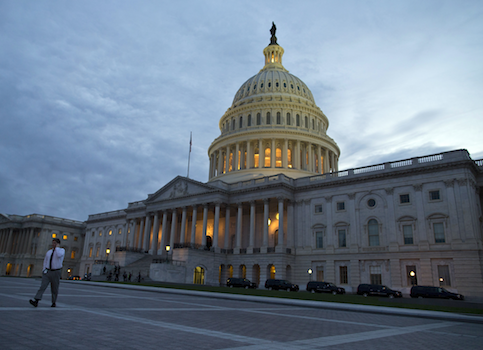A longtime pro-Iran advocate who has been accused of lobbying on Tehran’s behalf held a closed-door briefing on Capitol Hill Wednesday as nuclear negotiations in Geneva reached a critical tipping point.
Trita Parsi, founder of the National Iranian American Council (NIAC), an anti-economic sanctions group that has been accused of carrying Tehran’s water in Washington, led a standing-room-only briefing of nearly 100 congressional staffers, according to multiple attendees.
Parsi advocated against the passage of new sanctions on Iran and urged the West to accept an agreement with Tehran that allows it to continue to enrich uranium, the key component in a nuclear weapon.
The briefing, which was organized by Rep. Keith Ellison (D., Minn.), was held just hours before Israeli Ambassador to the United States Ron Dermer was scheduled to hold his own closed-door briefing for members of Congress.
The American Israel Public Affairs Committee (AIPAC) brought its top board members to Capitol Hill for a lobbying blitz on Tuesday, while former Obama administration Middle East adviser Colin Kahl briefed the Democratic Budget Group on Wednesday morning.
NIAC’s Parsi was joined at the briefing by Arms Control Association (ASA) executive director Daryl Kimball. It was sponsored by the Ploughshares Fund, a liberal anti-nuclear foundation that opposes sanctions on Iran.
Parsi said that any nuclear deal should permit Iran to continue enrichment and claimed that new economic sanctions on Iran would push it to more quickly pursue a nuclear weapon.
Observers pointed out that Parsi’s talking points hewed closely to those being pushed by the White House and its allies, who have fought to stop Congress from passing new sanctions on Iran.
Those who are pushing for Iran to end its enrichment activities are "completely unrealistic," according to Parsi.
"This insistence on a completely unrealistic objective, however ideal it may be or not be, has led to a situation in which, yes, the U.S. has more leverage because of sanctions and the ability that’s had in harming the Iranian economy," Parsi said, according to multiple staffers and audio of the briefing obtained by the Washington Free Beacon.
"While we were pushing for zero [enrichment], we lost opportunities to stop the Iranian program" over the past several years, he said. "It’s a pipe dream to think that you can get down to zero."
Parsi praised the multiple rounds of negotiations that have taken place over the past months.
"If we gamble too hard on unrealistic objectives we may actually end up in the worst possible outcome," he said.
New sanctions should not be passed while negotiations take place, Parsi said.
"I think what we should be careful about is if there are new sanctions coming in at a moment when negotiations are actually succeeding, at a moment when the Iranians have for the fist time in 80 years adopted a much more dramatic and moderate position, the reaction on that side will be that they have to do something," Parsi said.
"Will they refuse to stop 20 percent [enrichment levels]?" he asked. "Will they actually go above and start enriching it above 20 percent in retaliation? Lets just imagine they will do one of those things."
Some staffers present in the briefing said that they were surprised by the large turnout and speculated that most congressional offices are not aware that many view NIAC as a public relations arm of the Iranian regime.
"I was surprised to see so many people there," said one staffer present at the briefing. "There’s a danger that [NIAC is] seen as reasonable when they’re taken at face value."
Meanwhile, Israeli Ambassador Dermer met with more than 30 House lawmakers Wednesday evening to communicate his government’s concerns about Iran and the parameters of a potential deal.
"The discussion focused on the Iranian nuclear threat and ongoing negotiations between world powers and Iran, including the need to maintain pressure on Iran throughout the diplomatic process," according to a read out of the meeting, which was jointly organized by the Republican Israel Caucus and Democratic Israel Working Group.
A nuclear deal with Iran could be reached within the next several days, according to reports.
Iranian nuclear negotiator Seyed Abbas Araqchi said late Wednesday that discussion on a final deal will likely begin today.
"We will talk about the trend of negotiations tonight [Wednesday] and if we achieve good results, the negotiations about the text [of the final agreement] will likely start tomorrow," Araqchi said to Fars News Agency on Wednesday.
